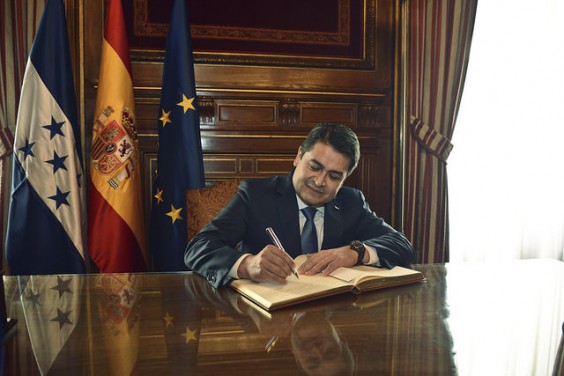Information Should Never Be Left to Die
by Dina Meza translated by Maria Tenorio / May 22, 2015 / No comments

President Jaun Hernando Hernandez is at the center of the corruption scandal. Photo via Flickr user: Casa de América.
Restricting the distribution of information in Honduras facilitates massive political corruption.
The Right to Information in Latin America, published by UNESCO, indicates: “The right to information is at the heart of democracy. Only citizens who are well informed about the intentions and actions of their elected leaders can contribute effectively to the process of decision-making affecting their future. In the most basic sense, democratic participation depends on the ability of citizens to access the information they need to take control within society.”

- Honduras has one of the world’s highest murder rates. It is also one of the most dangerous countries to practice journalism, ranking 129th out of 180 in the 2014 World Press Freedom Index. Journalists are regularly threatened, attacked, and killed for their work. The Honduran government fails to punish those who use violence against reporters, essentially granting them impunity. This space will be dedicated to examining the lack of protection for Honduran journalists exercising their profession. Topics will include the use of state-sponsored advertising as a mechanism to reward or punish publications, and censorship and self-censorship as hindrances to democratic progress.

- Born in Cofradía, Honduras, Dina Meza has been recognized by PEN International, Amnesty International, Index on Censorship and Reporters without Borders for her work as a journalist and human rights advocate. Currently, Dina is the driving force behind the creation of Honduras PEN Centre. In 2013, she wrote “Reign of Terror,” an in-depth report on threats to Honduran journalists for Index on Censorship’s magazine. In 2014, she was named one of Reporters Without Borders’ “100 Heroes and Heroines of Information.”
As this statement applies to Honduras, it could mean that my country has no heart because information is not a priority for our decision-makers. Democracy is far from being achieved.
What serious damage to the Honduran society depleted of vital information; indeed, it has no control in the decision-making process.
When the information finally finds a way out, it encounters many wolves, just like Little Red Riding Hood visiting her grandmother. These predators, one way or another, cloister it so that never comes out. If it does, it is distributed in a distorted way.
Just look at corporate media, owned by a few people. There we find that there is lots of important information missing; it is never published because it does not work in the interests of those with a direct connection to the owners of the media, either through economic or political means.
I believe that in Honduras, nine out of 10 professional journalists working for corporate media will have a story about direct or indirect censorship, imposed so that information obtained from external sources will not get past the newsroom.
We can say that when this happen, it causes irreparable harm. Who can rescue this lost information? Sometimes, diligent citizens can follow up on clues left behind by the information predators. In other cases, socially committed journalists, regardless of the risks involved, can obtain this information and channel it to others who are open to publish anything society is interested in.
If we review the media that is published daily, and compare that information with Honduras’s reality, we find an information vacuum. In many cases, we observe that the information was manipulated before it hit the public, so what society gets is too far from the truth.
The plundering of the Honduran Institute of Social Security, a very serious act of corruption, has been a daily media circus. The real parties who are responsible for stealing millions of lempiras are relaxed, their pockets full, laughing until they die because there is no justice in sight, and there might never be.
After Radio Globo and Globo TV published the story, the pestilence kept coming out. Conclusive evidence directly pinpoints parties linked with the National Party. According to financial records, never publicly released, millions of lempiras were used to finance the campaign of now-President Juan Orlando Hernández.
But the National Party and its leaders have responded to the media by taking all the information to a basement secured with thousands of locks, so that it will never be known at all.
Statements have been released on party leaders’ behalf denying their involvement. The former president has called for citizens to protest in front of the National Congress. Party leaders have threatened to file lawsuits for defamation if the media continues to release more information.
The State uses prosecutions for libel as a powerful weapon to intimidate the media; it imposes censorship and generates silence. On November 5, the Inter-American Commission on Human Rights (IACHR) issued a precautionary measure in the case of the journalist Julio Ernesto Alvarado.
However, there is a more powerful weapon to fight this problem. Public pressure from citizens can stop the death of information and give society the necessary tools for decision making.




